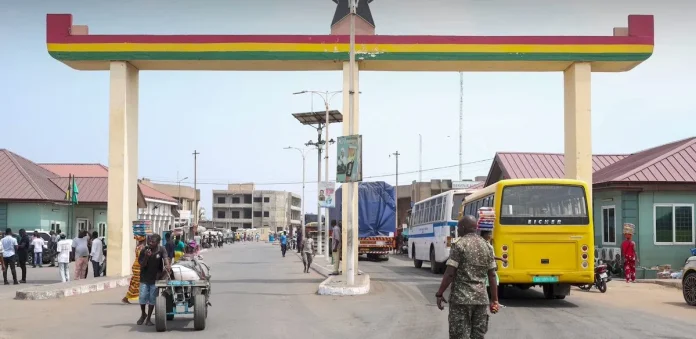The Comptroller-General of the Ghana Immigration Service, Samuel Basintale Amadu, has called for enhanced partnerships with neighbouring countries and border communities to combat transnational crime across West Africa. His appeal comes at a time when security concerns along Ghana’s northern borders have intensified following recent violent incidents.
During a courtesy visit to North East Regional Minister Ibrahim Tia in Nalerigu, the immigration chief stressed that a multi-stakeholder approach remains essential for tackling illicit drug trafficking and other cross-border criminal activities. The meeting, which took place during his two-day tour of the region, brought together all Municipal and District Chief Executives to discuss pressing security challenges.
The visit follows a deadly attack on October 3, 2025, when unknown gunmen killed Assistant Immigration Control Officer II Rafiq Mohammed and severely wounded his colleague at the Gbintiri checkpoint. The brutal assault has highlighted the vulnerabilities facing immigration personnel stationed at remote border posts.
Minister Tia condemned the attack in strong terms, describing it as an unacceptable threat to national peace and security. He urged law enforcement agencies to pursue the perpetrators relentlessly and bring them to justice. The minister also pledged his administration’s full support to immigration officers, assuring them that the Regional Coordinating Council stands firmly behind their efforts.
The Comptroller-General’s appeal for land acquisition to construct a functional regional headquarters in the North East Region underscores the service’s commitment to improving operational efficiency. Such infrastructure, he argued, would significantly enhance the coordination of border security operations in the area.
Beyond his engagement with government officials, Amadu also met with traditional leaders during his tour. He visited the Overlord of the Mamprugu Traditional Area, the Paramount Chief of the Gbintiri Traditional Area, and the Paramount Chief of the Bunkpurugu Traditional Area, seeking their support in combating the illicit drug trade along border corridors.
The immigration boss has assured personnel that the service is actively working to retool various checkpoints with needed logistics and beef up security at duty posts. He acknowledged that security challenges remain significant, particularly in the northern enclave, but emphasized that everything possible is being done to arm officers and provide adequate support.
The tour concluded at the Walewale Municipal Assembly, where Amadu engaged with immigration officers to discuss operational challenges and concerns they face daily. These interactions reflect a broader effort to understand ground realities and address systemic issues affecting border security management.
The call for regional collaboration gains urgency against the backdrop of ongoing instability in the Sahel region. With terrorist activities spilling over from neighbouring countries, Ghana’s northern borders have become increasingly vulnerable to infiltration by criminal networks engaged in drug trafficking, human smuggling, and arms proliferation.
Strengthening partnerships with border communities appears central to the immigration service’s strategy. Local populations possess invaluable knowledge about movement patterns and suspicious activities that formal security structures often miss. Harnessing this community intelligence could prove decisive in making the region less attractive to criminal elements seeking to exploit porous borders.
Source: newsghana.com.gh











